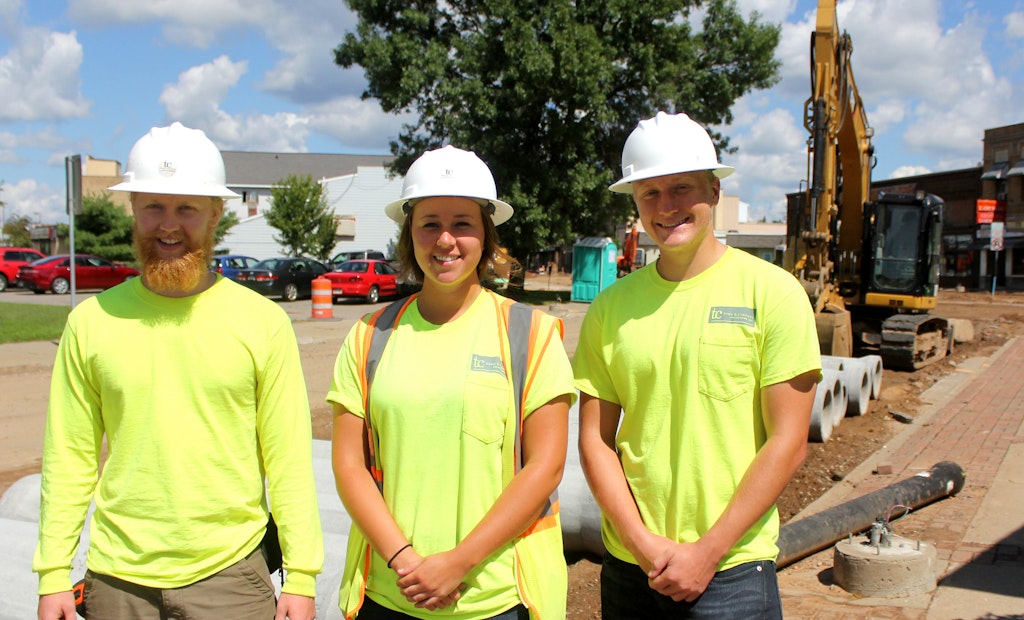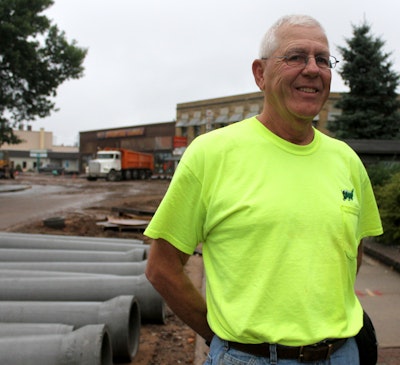
Interested in Education/Training?
Get Education/Training articles, news and videos right in your inbox! Sign up now.
Education/Training + Get AlertsManaging a project as large as the Rhinelander Downtown Streetscape Project can be a daunting task for any engineering firm, and it’s been no different for Town & Country Engineering.
Instead of bringing on other full-time engineers to assist, Town & Country opted to go a different route: college students needing real-world experience as well as college credits.
“If they weren’t here, we’d be hiring other technicians,” says Frank Brey, project engineer. “This project is too big for (chief engineer) Mark (Barden) and myself. It requires the type of monitoring the interns have been able to provide. They are basically my eyes and ears out in the field.”
Since May, two fifth-year Michigan Technological University engineering students have been working on the Rhinelander project alongside Town & Country Engineering — Bryce LeBrun and Carly Gloudemans. A third intern, Derrick Bohl, joined the team in August to take over for Gloudemans when she wrapped up her time in Rhinelander.
“The time here has been invaluable,” LeBrun says. “Being at a job this big exposes you to a lot of different things. Before working here, the only pipe I’d worked with had been culvert. I had never seen actual pipe being put in like here. It’s been very educational and a great experience.”
Handling the Community
The three interns have had many job duties while on the work site, from surveying to monitoring work crews. They have even had to communicate with the general public.
“An internship like this can be truly valuable because they’re not only getting a good idea of the technical aspects of what we’re doing — and they’re learning a lot in that respect — but there are also a lot of interactions with the public,” Brey says. “They don’t teach a lot of that in the textbooks. The interns have seen a lot of that this year where we had to resolve various issues in the field and looked at all the criteria before making a decision.”
Since the project is centered in the city’s downtown, much of that public interaction has been with local business owners.
“We were working with the business owners when we were in front of their buildings and helped people who were walking down the streets to shop,” LeBrun says. “I’ve never had to do anything as far as the communication side yet, so it was good to experience that part of a project.”
Many Learning Activities
On a project that encompasses three main thoroughfares and several side streets in a downtown area that’s over a century old, there are bound to be many learning experiences.
“The objective is to give them as much exposure to our civil engineering profession as we can out in the field,” Brey says. “It’s my responsibility to understand the skill level they’re at and then train them to do the tasks we need completed in order to properly monitor the construction.”
Each of the interns came into the project with different backgrounds. LeBrun is majoring in civil engineering with an emphasis on water systems. Gloudemans’ major is environmental engineering. Bohl is also in civil engineering.
“With me being in environmental engineering, I had never done any surveying, so this project gave me the opportunity to learn about that,” Gloudemans says. “You learn something new every day on this job.”
For LeBrun, handing out payments to contractors and subcontractors was a new experience. “It’s just something you never think about doing when you’re in class learning about this,” he says. “In class you’re learning about the technique and designing, not about the behind-the-scenes things you get to actually experience on job sites.”
Getting Real-World Experience
Brey, who directly supervised the interns out in the field, gave them projects throughout the course of the summer months but also allowed them to make decisions on their own.
“I try to make sure they understand how far they can go and let them also take it further at times,” Brey says. “For example, if we’re monitoring elevations of something that the power company is doing on their duct banks, initially I walk through it with the interns. When we have to do it again, I give them a little more responsibility with setting the surveying equipment and shooting it. Later on, I just have them do it and I check their work and that’s where we are now. They’ll get the equipment set up and call me over when the work is done to check it.”
Brey says he’s seen development in all the interns.
“They’ve come a long way,” he says. “I remember Carly’s first day on the job. She came in and her eyes got super wide and she was a little overwhelmed. It can be intimidating, but they’ve all grown.”
Even Bohl, who arrived at the site Aug. 17 and wrapped up his internship just nine days later after starting the summer on a residential project in Madison, Wisconsin, benefited from the experience.
“It’s the biggest project I’ve been on, nothing like the little residential ones I was on in Madison,” he says. “It’s good to be on a project this size and see how things operate.”
Time out of the classroom on a municipal project also helps the interns determine if all the real-world experiences are something they’d like to do on a daily basis, says Brey.
“Understanding how municipal governments operate, especially as how it relates to the civil engineering profession, is another very valuable thing that they’ve learned and it helps them in making a decision about whether they really want to pursue something in this field or not,” Brey says. “To me, we’ve succeeded if we’ve given them the information to make a good decision.”






